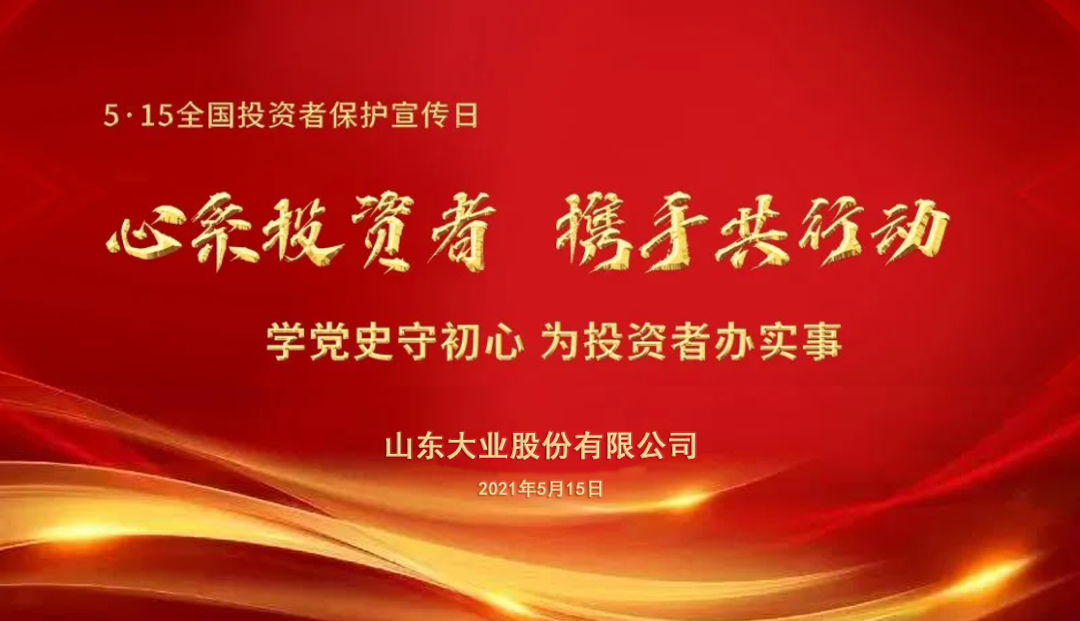Daye shares|Heart to investors, join hands and act together on May 15th National Investor Protection Publicity Day
In order to safeguard the legitimate rights and interests of small and medium investors, ensure the sustained and healthy development of the capital market, implement the spirit of important instructions and related requirements on capital market construction, and uphold the principles of fairness, justice, openness and protection of the legitimate rights and interests of investors, the China Securities Regulatory Commission The establishment of "5· 15 National Investor Protection Publicity Day" aims to carry out activities nationwide on a fixed date each year, to further promote a rational investment culture, to gather consensus from all parties in the market, and to make the concept of investor protection deeply rooted in the hearts of the people.

The theme of the third "5•15 National Investor Protection Publicity Day" in 2021 is "Be mindful of investors and act together-learn from the party's history and keep the original aspirations, and do practical things for investors". Shandong Daye Co., Ltd. (stock abbreviation: Daye shares, stock code: 603278) actively responded to the call of the Shandong Securities Regulatory Bureau to interpret the relevant content of the investor protection chapter established in the new "Securities Law" for investors:
1. What are the provisions of the new "Securities Law" on the investor suitability system?
The new "Securities Law" imposes separate regulatory requirements on securities companies and investors. For securities companies, in general, it is necessary to understand customers, reveal risks, and make it clear that sellers are responsible. As far as investors are concerned, they should cooperate with the securities company to provide real personal information in accordance with the express requirements of the securities company. If the securities company refuses to provide or fails to provide information as required, the securities company shall inform its consequences and refuse to sell securities or provide services to it in accordance with the regulations.
2. Why distinguish between ordinary investors and professional investors?
The new "Securities Law" also makes a distinction between ordinary investors and professional investors, with the purpose of providing more adequate protection for ordinary investors with relatively low risk tolerance and relatively insufficient investment expertise and professional capabilities. At the same time, a mechanism of "reversal of the burden of proof" has been set up. When ordinary investors have disputes with securities companies, securities companies shall prove that their actions comply with laws, administrative regulations and the provisions of the State Council's securities regulatory agency, and there is no misleading or fraudulent situation. If the securities company cannot prove it, it shall bear the corresponding liability for compensation.
3. What kind of collection system has been established in the new "Securities Law" for the exercise of shareholder rights of listed companies?
The solicitation system for shareholder rights of listed companies can help small and medium investors overcome time and cost constraints, better participate in corporate governance activities, and actively express various opinions on company management. In this regard, the new "Securities Law" has made specific provisions in five aspects:
The first is to collect the main body, clarify the listed company’s board of directors, independent directors, shareholders holding more than one percent of the voting shares, or investor protection institutions established in accordance with laws, administrative regulations, or the securities regulatory authority of the State Council (hereinafter referred to as “investors”). Protection agency), can be used as a collector.
The second is the method of solicitation. It is clear that the solicitor shall, by himself or by entrusting securities companies and securities service agencies, publicly request the shareholders of the listed company to entrust them to attend the general meeting of shareholders and exercise shareholder rights such as proposal rights and voting rights on their behalf.
The third is information disclosure. It is clear that the solicitor should disclose the solicitation documents, and the listed company should cooperate.
The fourth is forbidden behavior. It is clearly not allowed to publicly solicit shareholder rights in a paid or disguised form of compensation.
The fifth is legal liability. If it is clear that the public solicitation of shareholder rights in violation of regulations causes losses to the listed company or its shareholders, it shall be liable for compensation in accordance with the law.
4. How does the new "Securities Law" improve the cash dividend system of listed companies?
In recent years, the securities regulatory authorities have continued to strengthen the construction of the system, and actively guided and promoted the cash dividend distribution of listed companies through multiple measures and channels, and achieved remarkable results. In order to improve the cash dividend system of listed companies, the new "Securities Law" stipulates that listed companies should specify the specific arrangements and decision-making procedures for the distribution of cash dividends in the articles of association, and protect shareholders’ rights to return on assets in accordance with the law; If the after-tax profit has a surplus after making up for the loss and withdrawing the statutory common reserve fund, the cash dividend shall be distributed in accordance with the company's articles of association.
5. How does the new "Securities Law" protect bond investors and bond holders?
First of all, the new "Securities Law" stipulates that if corporate bonds are issued publicly, a bondholders meeting should be established. Secondly, it is clarified that issuers of public bond offerings should hire bond trustees, and bond trustees should perform their duties diligently, perform their duties of trustee management fairly, and must not harm the interests of bondholders. Finally, in order to effectively respond to the default of the bond issuer, the bond trustee may accept the bondholder’s entrustment to initiate or participate in civil litigation or liquidation procedures on behalf of the bondholder in his own name.
6. How does the new "Securities Law" stipulate the advance payment system?
The new "Securities Law" establishes the system of advance compensation, clarifying that if the issuer causes losses to investors due to fraudulent issuance, misrepresentation, or other major illegal acts, the issuer’s controlling shareholder, actual controller, and related securities company An investor protection agency can be entrusted to reach an agreement with the investor who has suffered losses on compensation matters, and pay compensation in advance. After the compensation is paid in advance, the issuer and other persons with joint liability may be pursued in accordance with the law.
7. In the new "Securities Law", how does the investor protection agency play a role in the resolution of diversified disputes?
Investor protection agencies are of great significance in using professional advantages to protect investors and to actively advocate and exercise rights on behalf of investors. The new "Securities Law" specifies three mechanisms for investor protection agencies to resolve disputes on behalf of investors.
The first is the mediation mechanism. In the event of disputes between investors, issuers, securities companies, etc., both parties can apply to the investor protection agency for mediation. Where an ordinary investor has a securities business dispute with a securities company, and the ordinary investor requests for mediation, the securities company shall not refuse.
The second is to support litigation. Investor protection agencies can support investors to file lawsuits with the people’s courts in accordance with the law for behaviors that harm investors’ interests.
The third is derivative litigation. The issuer’s directors, supervisors, and senior managers violate laws, administrative regulations, or the company’s articles of association when performing their duties and cause losses to the company. The issuer’s controlling shareholders and actual controllers infringe on the company’s legitimate rights and interests. In the event of losses, if the investor protection agency holds the company’s shares, it can file a lawsuit in the People’s Court in its own name for the benefit of the company. The shareholding ratio and period of shareholding are not related to Article 151 of the "Company Law of the People's Republic of China". Hold more than one percent of the company’s shares individually or in total for more than 180 consecutive days.
8. The new "Securities Law" explores the establishment of a securities class action system with Chinese characteristics. What should investors know about this?
The new "Securities Law" explores the establishment of a securities class action system with Chinese characteristics to meet the needs of strengthening investor protection and rights relief under the reform of the securities issuance registration system.
The first is to give full play to the role of investor protection agencies and allow them to accept the entrustment of more than 50 investors as representatives to participate in litigation.
The second is to allow investor protection agencies to register litigation subjects with the people's courts in accordance with the rights holders confirmed by the securities registration and settlement agencies.
The third is to establish a litigation mechanism of "implicit entry" and "explicit exit", which makes it easier for investors to protect their legitimate rights and interests.









